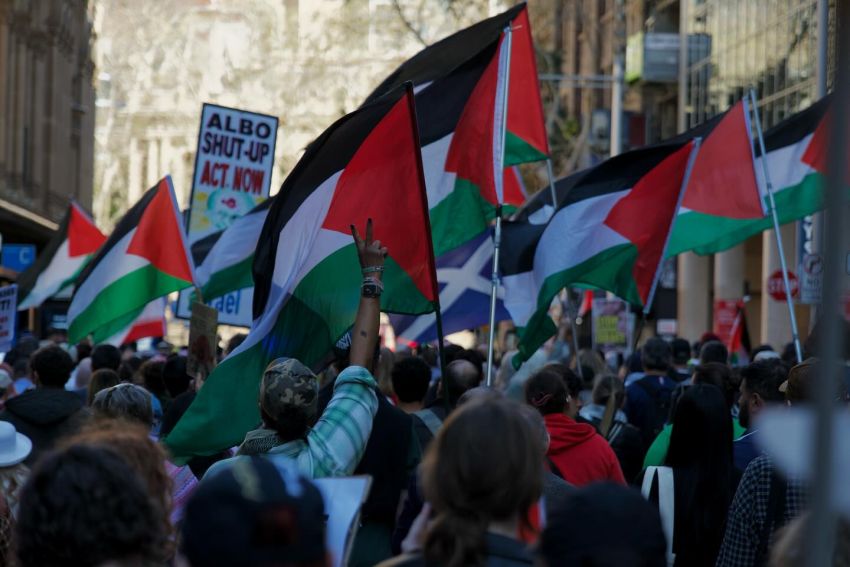
Does the massive outpouring of support for the Palestinian people, demonstrated by the August 3 Sydney Harbour Bridge march and the August 24 National March for Palestine, mark a turning point?
They are a vindication of the campaign’s persistent hard work in defence of Palestinians’ basic human rights. They reflect the disgust and horror that most people feel when finally exposed to the reality of the genocide in Gaza.
But we still have a long way to go.
The fact remains that Australia is still materially aiding and abetting the genocide through its bilateral military ties and other trade with Israel, and the Anthony Albanese government still shows no sign of budging on this.
For those that marched for the first time, we will have to convince them that they need to march again. In fact, the movement will have to grow and significantly intensify to force the federal government’s hand.
This means even the huge demonstrations are not enough. There needs to be a flourishing of activity in between the demonstrations that keep the issue boiling away in the national debate.
Whether film nights or direct actions, they all need to multiply. This will develop the skills and confidence of new layers of activists who can deepen the campaign to another level.
Labor’s refusal to act and the need for the movement to intensify is explained by Israel’s strategic value, both military and economic, for the West. In particular, Israel functions as a battering ram to smash any force in the Middle East that threatens Western imperialist interests.
Some Western leaders may want Israel to moderate its violent rampage in Gaza a little, but they have no intention of demanding it make even modest steps towards peace with justice.
The opposition Coalition’s job is easy — concede nothing and support Israel all the way. It simply appeals to existing racist prejudice in which “civilised” people identify with the wealthy colonial settler colony, which regards Palestinians as “barbarians”.
Albanese has a much more difficult task.
Under pressure from Labor’s base, Albanese is being forced to condemn extreme Israeli rhetoric and actions, especially as images of starving children flood our screens, while maintaining Australia’s support for Israel’s function as a garrison state.
Labor has a two track, or carrot-and-stick, approach. It resorts to every symbolic or secondary measure it can think of, while avoiding placing immediate sanctions on Israel, in particular on the two-way arms trade and other forms of military cooperation.
At the same time, Labor is attempting to undermine the Palestine solidarity movement with new anti-protest laws and allegations that any criticism of Israel is antisemitic and damages “social cohesion”.
Some say Albanese needs to grow a backbone and stand up to Israel. But this misses the point; he has shown great determination in resisting public opinion, while deploying as much spin as he can to pretend that he cares — all while not doing anything concrete to help stop the genocide.
His government’s priority is salvaging support for Israel in the West, with diplomatic recognition and dreams of a two-state “solution”.
However, this is not easy, given the genocidal mania gripping Israeli society, including the Benjamin Netanyahu government itself, which has declared it will not tolerate a Palestinian state in any form and plans to expel the entire population of Gaza.
The recent diplomatic spat with Netanyahu won’t change much, but this is more than theatre. Given that Netanyahu shows no sign of dialling back the genocide, the task of selling the lie that Israel is a “liberal democracy” is not getting easier.
But, forced to choose, Albanese will fall in behind United States President Donald Trump and stick with Israel — if we let him.
This has been shown by Australia’s severing of diplomatic ties with Iran, and the timing of the airing of ASIO’s allegations used to justify it. Given the hoax “weapons of mass destruction” intelligence reports used to justify the illegal invasion of Iraq in 2003, we have every right to be sceptical.
At the very least, it is not a coincidence that this story was released immediately after the National March for Palestine and a few days before defence minister Richard Marles flew to Washington to meet Pete Hegseth, his US counterpart.
On our behalf, Marles pledged unconditional obedience to the US empire by promising to spend yet more taxpayers’ money on war machines, as the far-right Trump regime has demanded.
It bears repeating: No matter how much worse the genocide in Gaza gets, the very last thing Albanese wants to do is take meaningful action that would put serious pressure on Israel to change course.
That would mean a rupture with US military strategy.
It is us, ordinary working people, who have to forge a campaign that is powerful enough to force the government to do the bare minimum — to respect international law and end support for Israel’s genocide in Palestine.
That means we need a laser-sharp focus on the central demand and slogan of the Palestine movement. We must raise it, whenever and wherever we can, shout it from the rooftops and paint it on the streets: Sanction Israel now!
[Sam Wainwright is a national co-convenor of the Socialist Alliance.]